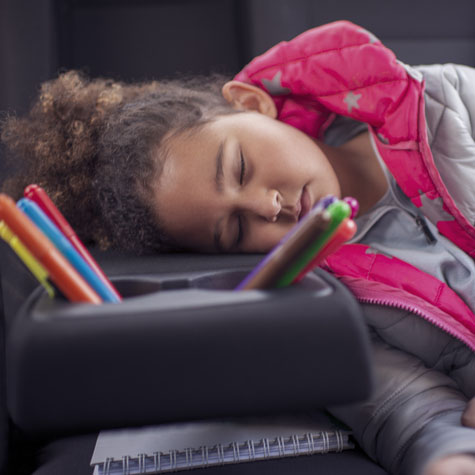 Children and sleep – two words that parents celebrate yet often worry about.
Children and sleep – two words that parents celebrate yet often worry about.
Helping children rest better is one of Molly Hoover’s primary responsibilities at the Covenant Sleep Center. As a nurse practitioner (and busy mom herself), she guides families in understanding differences in sleep needs and helps identify issues that negatively impact sleep. Her goal is to maximize ZZZZs for all ages, but especially children.
According to Hoover, children require 10-12 hours of sleep nightly to grow, develop and function effectively. Adults need 7-8 hours. Both benefit from a consistent bedtime routine including less screen time in the hours before hitting the hay. For kids, a bedtime routine might consist of three or four activities done in the same order as a “wind-down” for the day:
- Eating a light, healthy snack
- Brushing teeth
- Putting on PJs
- Dimming the lights and quieting down the household
- Reading a book
Keep it short, sweet and consistent, Hoover advises.
Throughout the day, families should note that children and adults react differently to being tired. “As far as I’m concerned, naps are wasted on the young,” Hoover jokes. While she and many adults embrace a restorative power nap, most children reject them – often getting more wound up and emotional the more tired they get. Ironically, some children misdiagnosed with ADHD might instead have underlying conditions that impact their sleep and, hence, worsen their behavior.
Most of the time, children are tired because they’ve had a busy, stimulating day, went to bed late the night before, or don’t feel well. When children are chronically tired, that’s the time to take a closer look at the quality of their sleep.
Sleep apnea can and does occur in children, Hoover explains. Sleep apnea is a condition where children experience pauses in breathing that interrupt sleep. It often happens are a result of enlarged tonsils or adenoids. Typical symptoms include:
- Snoring
- Bedwetting
- Restless sleep with lots of tossing and turning
- Teeth grinding
- Sleeping with chin toward the ceiling (which creates more room in the airway)
- Falling asleep on the school bus or in the car right after being picked up from school
If you notice any of these symptoms in your child, particularly if they are overweight, talk to your primary care provider about having a sleep study at the Covenant Sleep Center. Children come in overnight with a parent – and favorite snuggly toys – to have their sleep monitored and analyzed. If mild sleep apnea is diagnosed, most children can be treated with nose sprays at night. If tonsils or adenoids are an issue, the Covenant Sleep Center refers children to an area ear, nose and throat specialist for evaluation. In severe cases, children may be outfitted with a night-time breathing device – commonly called C-PAP therapy. This device gently blows pressurized air through a child’s nose to keep his or her throat and airway open.
Sleep apnea is just one of many sleep disorders diagnosed and treated at Covenant’s Sleep Center. There, Hoover and certified sleep specialist and neurologist Dr. Christopher Allen treat adults and children for insomnia, sleepwalking or talking, restless leg syndrome, and more.
“Often children grow out of sleep disorders,” Hoover explains. But, she cautions, “Do not ignore an issue that just doesn’t seem right. Talk to your doctor. Early diagnosis is so worth it because sleep is such an important building block for good health, behavior, attention, learning, and memory.”
To learn more about the Covenant Sleep Center for pediatrics, click here.